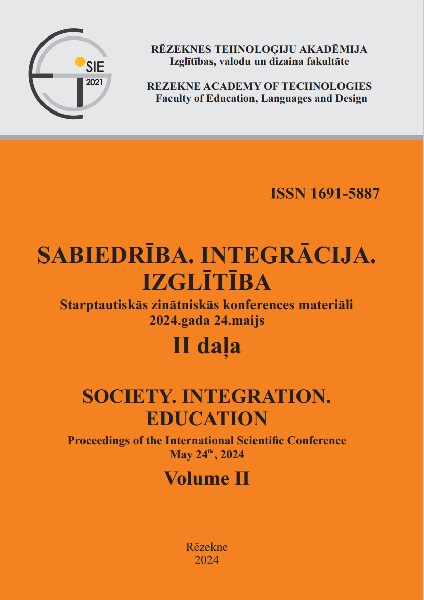THE IMPERATIVE OF REFORMS IN TEACHING FOREIGN LANGUAGES TO ADULTS: A METHODOLOGICAL NECESSITY AND SOCIAL TREND
DOI:
https://doi.org/10.17770/sie2024vol2.7813Keywords:
adult students, anti-agism, methodological need, social trend, teaching of foreign languagesAbstract
This article studies the imperative of reforms in teaching foreign languages to adults both from the social point of view and methodological needs of the particular process of foreign language teaching for representatives of a special age group. The starting point of the article is the authors` own experimental research in the form of a questionnaire, which, as the target audience, conducted a survey of people aged 45+ studying at or graduated from foreign language courses as a part of integration programs (the survey was conducted among relocants from Ukraine after February 24, 2022) finding out what factors contributed / did not contribute to their success and psychological comfort in language learning. The second part of the study presents the results of a survey of teachers who work in foreign language courses attached to higher educational institutions of Ukraine and presents their point of view on the difficulties of teaching in mixed age groups and in groups dominated by people over 40 years. The purpose of the article is to show that in order to fulfill the social tasks that modern society places on the study of foreign languages by older people, changes in methodological approaches to the stated process are necessary.
References
About the Crisis in Ukraine. (2024). Official site of the USA for UNHCR: the UN Refugee Agency. Retrieved from: https://www.unrefugees.org/emergencies/ukraine/
Agor, J. (2019). Noticing: Its Impact on Adult Users of English in a Non-Native Context. Education Quarterly Reviews, 2 (3), 666-683. DOI: 10.31014/aior.1993.02.03.97
Mei, B. (2022). The Characteristics of Adult Learners and Second Language Teaching Strategies. Proceedings of the 2022 International Conference on Science Education and Art Appreciation (SEAA 2022). DOI: 10.2991/978-2-494069-05-3_117.
Murphy, V., Arndt, H., Baffoe-Djan, J., Chalmers, H., Macaro, E., Rose, H., Vanderplank, R. & Woore, R. (2020). Foreign language learning and its impact on wider academic outcomes: A rapid evidence assessment. University of Oxford. Retrieved from: https://files.eric.ed.gov/fulltext/ED612981.pdf
Nilsson, J., Berggren, R., Garzon, B. & Lovden, M. (2021). Second Language Learning in Older Adults: Effects on Brain Structure and Predictors of Learning Success. Aging Neurosci., 13. DOI: 10.3389/fnagi.2021.666851
Rege, K. (2016). Midlife Career Transition: Benefits, Challenges and Strategies in New Trends Of Second Career Among Females (40-50 Years). Scholarly Research Journal for Interdisciplinary Studies, 4, 238-249. Retrieved from: https://www.researchgate.net/publication/368542821_Midlife_Career_Transition_Benefits_Challenges_and_Strategies_in_New_Trends_Of_Second_Career_Among_Females_40-50_Years
Rosa, J. (2022). 4 benefits of learning a second language at an older age. Retrieved from: https://www.goabroad.com/articles/4-benefits-of-learning-a-second-language-at-an-older-age
Schmidt, R. (2010). Attention, awareness, and individual differences in language learning. Proceedings of CLaSIC 2010. Singapore: National University of Singapore, Centre for Language Studies. Retrieved from: https://nflrc.hawaii.edu/PDFs/SCHMIDT%20Attention,%20awareness,%20and%20individual%20differences.pdf
Steber, S. & Rossi, S. (2021). The challenge of learning a new language in adulthood: Evidence from a multi-methodological neuroscientific approach. PLoS One. DOI: 10.1371/journal.pone.0246421
Van Sickle, K. (2017). Learning a New Language at Age 40+. Medium. Retrieved from: https://medium.com/@keith.vansickle/learning-a-new-language-at-age-40-588dd4e50492
Zilberman, A. (2019). Why Adults Struggle to Learn a Second language. eLearning Industry. Retrieved from: https://elearningindustry.com/adults-learn-a-second-language-struggle






